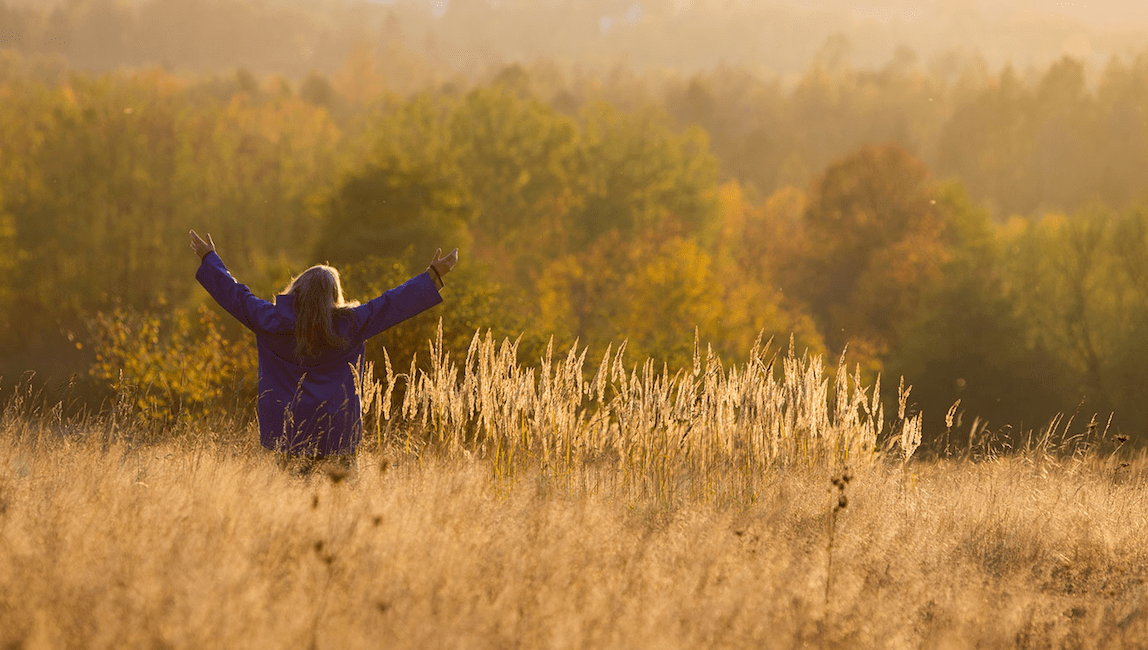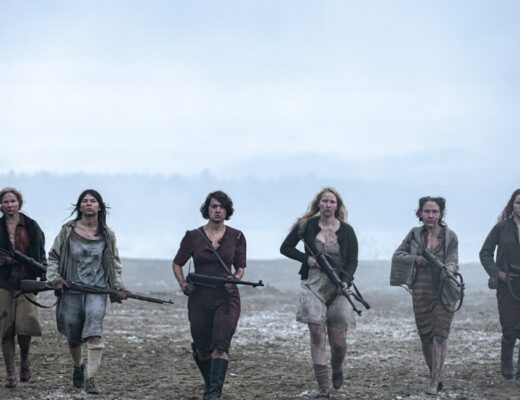Some of the most elegant and graceful tracking shots ever seen open Agnieszka Holland’s Spoor. They may be drone or helicopter-assisted; the camera, gravity-defying, soars over a remote snowy spot in the mountains of southwest Poland’s Kłodzko Valley region. In the late gloaming hours, some kind of search party, in Jeeps and pickups, are scouring the vast, cold, dark environs for something—or someone. Jolanta Dylewska and Rafal Paradowski are the credited cinematographers; Antoni Lazarkiewicz, who did the music, also contributes to the powerful mood-setting with a menacing, minimalist score. The atmosphere is reminiscent of Claire Denis’s thorny mind-bender L’Intrus, also set in some isolated frosty mountainous region and prominently featuring an older character living in seclusion with dogs. With L’Intrus, it was a memorable Akita Inu; here, it’s a pair of black and white pups who, one night, don’t answer to the call of their owner, English teacher Janina (Agnieszka Mandat-Grabka). Devastated, Janina begins a weeks-long search. No ordinary animal lover, she is angrily opposed to the constant hunting that surrounds her, to the point that when a wild boar is shot, out of season, she tenderly comforts the dying animal before going to the police and reporting it as a murder. This compassion for all life unfortunately marks Janina as a local eccentric, with even a priest condescendingly explaining to her that the Bible’s Commandments only apply to people, as animals don’t have souls. When human corpses start turning up, Spoor settles into the rhythms of a crime thriller and whodunnit—and, as the victims are hunters, Janina becomes a suspect.
Janina, meanwhile, believes that it’s the animals themselves who are taking revenge, and Holland’s phantasmagoric flourishes (bizarre dream sequences shot in a garish alternate style) seem to align with Janina’s possibly warped subjectivity. Like its protagonist, Spoor is a quietly radical film about the insidious effects of corrupt cultures with entrenched, unexamined, and harmful values. On the issue of animal rights, it’s a film that even the violent Animal Liberation Front would approve of. But Holland also finds space within this somewhat baggy 128 minutes (brimming with secondary characters and subplots) for a late-in-life romance of sorts between Janina and a new neighbor, Matoga (Wiktor Zborowski), an entomologist and ex-terrorist bomber. In a remarkable scene, the two radicals smoke a joint, which leads to uncontainable laughter. Matoga starts talking about his childhood and, still laughing, mentions (for the first time out loud, he says) that he walked in on his mother having hanged herself. It’s brutal to see that smile and laughter slowly morph into shocked despair, mixed with some relief at having unloaded the memory. Moments like these show why the prolific Holland (who in addition to her long list of features has also directed, for American television, episodes of shows like The Wire) is one of Poland’s most revered filmmakers.
Published as part of New York Film Festival 2017 | Dispatch 2.







